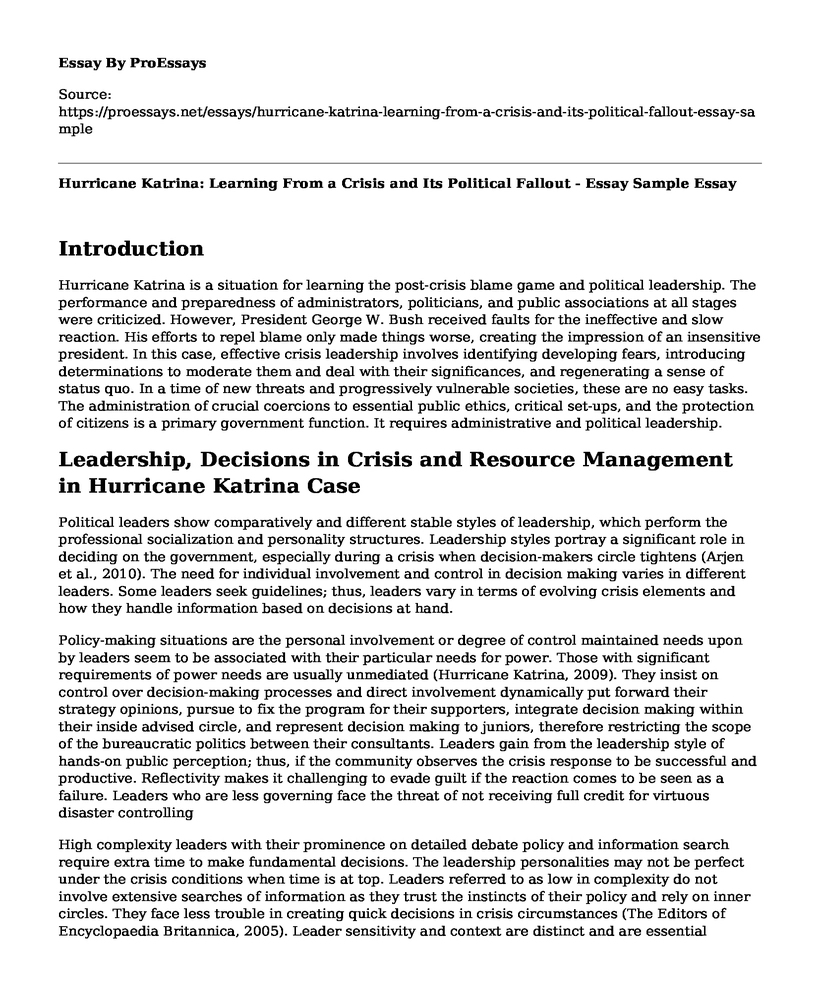Introduction
Hurricane Katrina is a situation for learning the post-crisis blame game and political leadership. The performance and preparedness of administrators, politicians, and public associations at all stages were criticized. However, President George W. Bush received faults for the ineffective and slow reaction. His efforts to repel blame only made things worse, creating the impression of an insensitive president. In this case, effective crisis leadership involves identifying developing fears, introducing determinations to moderate them and deal with their significances, and regenerating a sense of status quo. In a time of new threats and progressively vulnerable societies, these are no easy tasks. The administration of crucial coercions to essential public ethics, critical set-ups, and the protection of citizens is a primary government function. It requires administrative and political leadership.
Leadership, Decisions in Crisis and Resource Management in Hurricane Katrina Case
Political leaders show comparatively and different stable styles of leadership, which perform the professional socialization and personality structures. Leadership styles portray a significant role in deciding on the government, especially during a crisis when decision-makers circle tightens (Arjen et al., 2010). The need for individual involvement and control in decision making varies in different leaders. Some leaders seek guidelines; thus, leaders vary in terms of evolving crisis elements and how they handle information based on decisions at hand.
Policy-making situations are the personal involvement or degree of control maintained needs upon by leaders seem to be associated with their particular needs for power. Those with significant requirements of power needs are usually unmediated (Hurricane Katrina, 2009). They insist on control over decision-making processes and direct involvement dynamically put forward their strategy opinions, pursue to fix the program for their supporters, integrate decision making within their inside advised circle, and represent decision making to juniors, therefore restricting the scope of the bureaucratic politics between their consultants. Leaders gain from the leadership style of hands-on public perception; thus, if the community observes the crisis response to be successful and productive. Reflectivity makes it challenging to evade guilt if the reaction comes to be seen as a failure. Leaders who are less governing face the threat of not receiving full credit for virtuous disaster controlling
High complexity leaders with their prominence on detailed debate policy and information search require extra time to make fundamental decisions. The leadership personalities may not be perfect under the crisis conditions when time is at top. Leaders referred to as low in complexity do not involve extensive searches of information as they trust the instincts of their policy and rely on inner circles. They face less trouble in creating quick decisions in crisis circumstances (The Editors of Encyclopaedia Britannica, 2005). Leader sensitivity and context are distinct and are essential situations for blame attribution and crisis management. For instance, under custom decision-making conditions, leaders with high complexity who need additional time for the collecting of information produce High-quality decisions. In the event of a crisis, the leaders are at risk to blame from media and public who anticipate decisive and swift interventions. Enormous societal costs such as disease and death in the case of disasters offer political rivals with ammunition to attack ineffective leaders.
ReferencesArjen Boin., Paul 'T Hart., Allan Mcconnell., Thomas Preston (2010). Leadership style, crisis response, and blame management: the case of hurricane Katrina. Retrieved 4 March 2020 from, https://onlinelibrary.wiley.com/doi/abs/10.1111/j.1467-9299.2010.01836.x
Hurricane Katrina: Plans, Decisions, and Lessons Learned (2009). Retrieved 4 March 2020 from, https://www.voanews.com/archive/hurricane-katrina-plans-decisions-and-lessons-learned
The Editors of Encyclopaedia Britannica (2005). Hurricane Katrina. Retrieved 4 March 2020 from, https://www.britannica.com/event/Hurricane-Katrina
Cite this page
Hurricane Katrina: Learning From a Crisis and Its Political Fallout - Essay Sample. (2023, Apr 19). Retrieved from https://proessays.net/essays/hurricane-katrina-learning-from-a-crisis-and-its-political-fallout-essay-sample
If you are the original author of this essay and no longer wish to have it published on the ProEssays website, please click below to request its removal:
- Essay Sample on World Crisis and International Preparedness
- The Relationship Between Weathering, Erosion and Transportation - Research Paper
- Essay Example on Preserving Galapagos Sea Lions
- USDA Farm Bill - Essay Sample
- Air Quality and Pollutants Essay
- Essay Example on Global Warming Impacts on Business: Regulatory, Reputational & More
- Essay Example on Global Warming: How Human Activity Increases Climate Change







